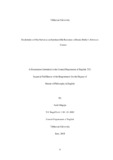Please use this identifier to cite or link to this item:
https://elibrary.tucl.edu.np/handle/123456789/2945| Title: | Exploitation of the Nature as an Inexhaustible Resource in Daniel Dafoe’s Robinson Crusoe |
| Authors: | Magaju, Sunil |
| Keywords: | Literature;Resources |
| Issue Date: | 2018 |
| Publisher: | Central Department of English |
| Abstract: | This research, on the basis of Daniel Dafoe’s Robinson Crusoe, explores how extensively the anthropocentric vision overwhelms the nature and natural species. Critiquing from the perspective of ecocriticism, I argue that the leading character, Robinson Crusoe transfers himself from an ordinary layman to the exploiter of the nature, right after he steps into an uninhabited island. His new identity as the exploiter is a significant departure from the widespread belief that human and nonhuman world has an interdependency and mutual harmony. Collectively, the research elucidates that the novel articulates the hierarchy among the living beings where the human beings have unceasing right to usurp the nature. The novel is also the striking example of the inferiority of the nature as the natural elements in the novel such as goats, pigeons, sea fishes and even the cannibals including Friday suffer and get trapped at the hand of Crusoe who intentionally lead, dominate, and victimize the natural species. Consequently, the natural species are mercilessly killed, suffer from homelessness, and are compelled to assimilate Crusoe’s rule and regulation. Similarly, cannibals suffer from acculturation as they are forced to abandon their habit of having uncooked food, and follow the human tradition to speak, to eat and to survive. In this regard, this research exposes Crusoe as an agent of anthropocentrism who pretends to save the natural species but for his own betterment, survival, and prosperity. It also evidently explains that Crusoe is not the existential surviving hero but an antagonistic force, who not only uses the natural environment ruthlessly for his own benefit but also tortures and inhumanly kills the natural animals. His arrival is the main cause of the disturbance of the natural harmony among living things and non living things. |
| URI: | http://elibrary.tucl.edu.np/handle/123456789/2945 |
| Appears in Collections: | English |
Files in This Item:
| File | Description | Size | Format | |
|---|---|---|---|---|
| Cover page-2.pdf | 399.95 kB | Adobe PDF |  View/Open | |
| Chapter Page-3.pdf | 709.68 kB | Adobe PDF |  View/Open |
Items in DSpace are protected by copyright, with all rights reserved, unless otherwise indicated.
